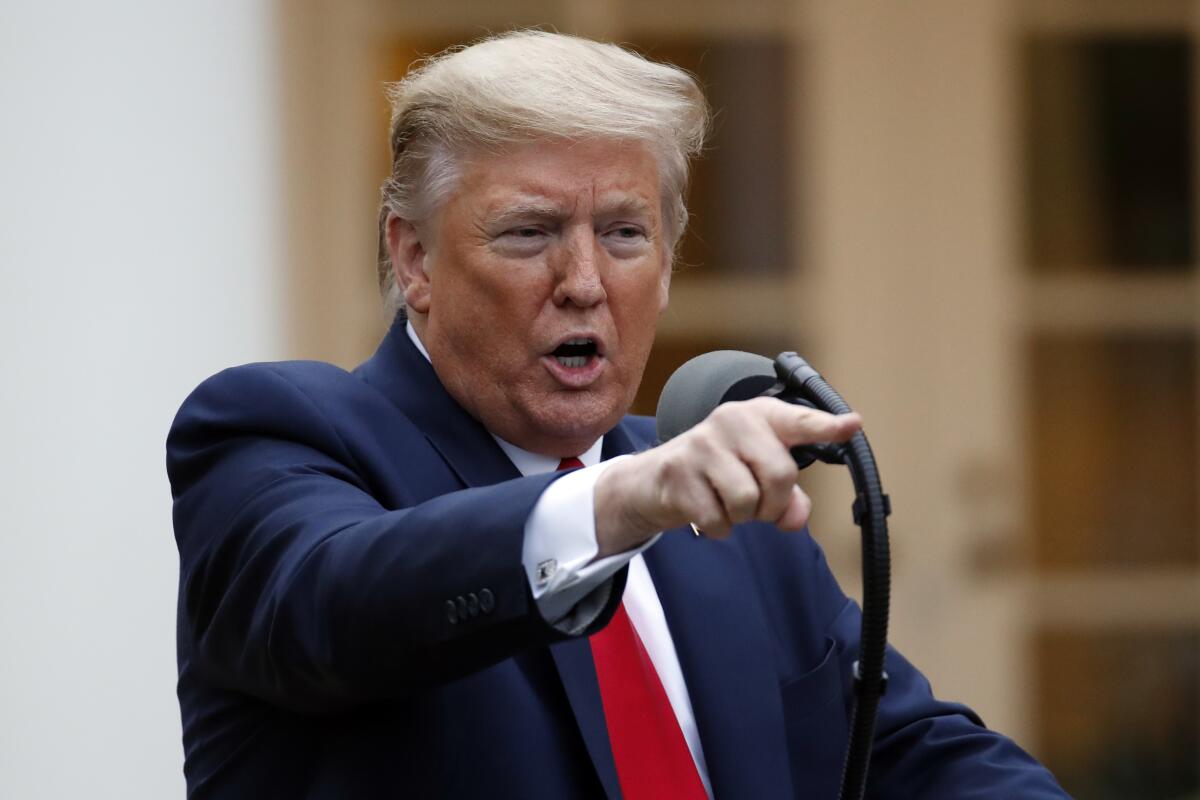Opinion: Trump has made three unconscionable power grabs this week. And it’s only Thursday

- Share via
This week, President Trump has made three assertions of presidential power, two of them breathtakingly audacious.
And it’s only Thursday.
On Monday, he insisted he had “total” authority to order state and local officials to lift the restrictions they’d placed on businesses and residents in the name of protecting public health. On Tuesday, he claimed the power to nullify Congress’ decision to appropriate more than $100 million to the World Health Organization. And on Wednesday, he declared that he could force Congress to adjourn because it wasn’t approving his nominees quickly enough.
None of these claims are credible (although two of them carry a patina of legality).
The consensus among legal experts is that Trump has no power, either under statute or the Constitution, to countermand the stay-at-home orders or the nonessential business shutdowns that mayors and governors have put in place. But a bigger problem, as The Times’ Michael Hiltzik points out, is that the economy won’t spring to life on any politician’s command; it will be up to businesses and consumers to come out of their bunkers, return to their workplaces and accept the risk of infection.
Nor does federal law allow the president to hold up payments to the WHO that Congress ordered simply because he wants to force changes at the world body — regardless of the merits of those changes.
Congress just went through this a few months ago, after lawmakers discovered that Trump had held up security aid for Ukraine in an apparent attempt to pressure the Ukrainian government to investigate Joe Biden. The Government Accountability Office declared in no uncertain terms that Trump’s actions violated federal law; the same reasoning applies to the dollars (formally known as an “assessed contribution”) that Congress explicitly and unambiguously appropriated to pay the country’s WHO dues.
For his third power grab, Trump sought to bypass Congress’ power of advise and consent on nominees for top executive branch posts. He complained Wednesday that a number of important nominees, including his picks for director of national intelligence and the Federal Reserve Board of Governors, weren’t getting votes in the Senate while the body was in “pro forma” session as a consequence of the outbreak. If the Senate is adjourned for 10 days or more, he would be entitled under the Constitution and a 2014 Supreme Court ruling to make a “recess appointment” — that is, to appoint someone without Senate approval to serve through the next session of Congress.
One problem is that the Senate cannot adjourn for more than three days without the House’s approval. So even though Trump’s Republican allies control the Senate and might be inclined to help him make recess appointments, Democrats control the House and could not be expected to play along.
The Constitution states that, in the case of a disagreement between the two chambers “with Respect to the Time of Adjournment, the president may adjourn them to such Time as he shall think proper.” So if the Senate voted to adjourn, Trump could conceivably force the House to follow suit, opening the door to recess appointments. (Although the power appears never to have been used, four conservative Supreme Court justices cited it in a concurrence to the aforementioned 2014 ruling as “a way to force a recess.”)
But don’t get too worked up about such a possibility. Senators are scattered to the four winds, and the chamber cannot hold any kind of vote unless there is unanimous agreement to do so. If even one Democrat (or Republican) wants to prevent a vote on adjournment and keep the Senate in pro forma session, that member can do so.
The irony is that the Senate got into the habit of holding pro forma sessions during the Obama administration, so Republicans could prevent the Democrat in the Oval Office from making recess appointments. Trump is reaping what his party sowed.
Will there be more brazen assertions of an imperial presidency this week? We’ll know soon enough. On Thursday, Trump is expected to revisit the issue of lifting the social distancing rules, but word is that he’ll offer guidelines, not mandates, for restarting the economy. Guidelines could be helpful, especially if they set up a national framework that reduces the risk of new outbreaks. Trump should settle back into the job he holds, rather than trying again to loosen the limits on presidential power.
More to Read
A cure for the common opinion
Get thought-provoking perspectives with our weekly newsletter.
You may occasionally receive promotional content from the Los Angeles Times.










